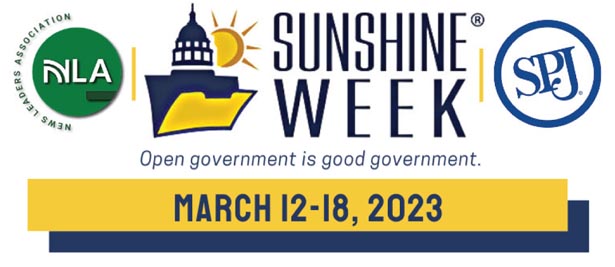More light needed

It’s Sunshine Week in South Carolina and across the nation, a time to recognize the importance of access to public information and accountability in local government.
 We should start off by saying it’s not just media that has access to the Palmetto State’s Freedom of Information Act. You do, and it’s important you’re well versed on it. We’ve had instances of citizens poking around government and coming to us with their own findings.
We should start off by saying it’s not just media that has access to the Palmetto State’s Freedom of Information Act. You do, and it’s important you’re well versed on it. We’ve had instances of citizens poking around government and coming to us with their own findings.
We would humbly remind everyone it was Westminster resident and former city council candidate Wendy Golten who found information that revealed some seriously questionable purchases made by one city committee in desperate need of oversight last fall.
While great strides have been made in the open records law that was last modified in 2017, there are still some agencies that look to circumvent or — even worse — try to obstruct the law because they know they won’t really get in trouble over it.
It is worth pointing out many of the entities we cover daily comply entirely with the law and respond in a timely manner, save for one particular agency we’re taking a good, hard look at right now. More on that later, hopefully.
We’ll run through a few quick hiccups we’ve seen here of late. At Clemson University, it’s commonplace to receive an investigative report on Greek life shenanigans with pages — yes, pages — completely blacked out and redacted. Good luck coming up with a good-faith argument to justify that.
We’ve had inconsistent billing for documents we’ve requested in the past, only to come back with a higher cost than the last time. Is inflation really hitting hard in the electronic documents economic sector?
In February, we reported on a Six Mile man being charged with felony driving under the influence resulting in death in a fatal November crash. Naturally, we contacted the South Carolina Department of Public Safety for the “incident report, arrest warrants and any other supplementary documentation” on the case, but never checked a box requesting the dispatch audio/log.
That didn’t stop the agency from trying to bill us for it. In all, they wanted $175 for us to be able to tell you how this person was charged with such a serious offense.
After being called out for the absurdity, we got some gobbledygook back from the state office about how it is woefully inundated with requests — by the very person whose job it is to fulfill them — and how, actually, arrest reports, warrants and collision reports are provided to the media at no cost.
Did that public information officer provide them in that email with the halfhearted explanation? Of course not.
The last little battle we plan on pushing back on is over the withholding of supplemental police reports. Sometimes, we’ll receive initial incident reports that only have a few sentences concluding with, “See supplemental for further.” In the supplemental, there is much more color and insight on whatever is alleged to have happened.
After internally questioning why we couldn’t get hold of those supplemental reports in an active investigation or case, we were recently informed by South Carolina Press Association media lawyer Taylor Smith that they are fair game. Police are required to disclose any report that includes “the nature substance, and location of any crime or alleged crime reported as having been committed” as defined in Section 30-4-50(A)(8).
There are others across the state who have had their own issues with agencies not following the law, and we’ll try to highlight them here.
Not all is doom and gloom, though. There is still sunshine coming through the clouds. We’re grateful to have a tool to provide transparent coverage and only want it to be stronger.




























